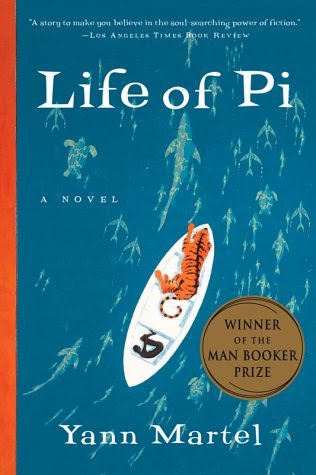 I feel like everything I'm reading lately is asking me to seek out wonder or spend some time in the depths pondering the darker corners of life. A former student has been begging me to read Life of Pi by Yann Martel for months and I finally did. Pi is the boy narrator, who is from India and the son of a zookeeper, but most importantly very spiritual. The beginning of the story chronicles his journey of belief in not only his native Hinduism (though his family wasn't especially religious), Christianity, and Islam. In response to political is family leaves for Canada on a Japanese ship, which sinks on its journey. Pi alone ends up in a life boat with a Bengal tiger, zebra and orangutan floating on the ocean for 227 days and is left with his knowledge of zoology and his spirituality.
I feel like everything I'm reading lately is asking me to seek out wonder or spend some time in the depths pondering the darker corners of life. A former student has been begging me to read Life of Pi by Yann Martel for months and I finally did. Pi is the boy narrator, who is from India and the son of a zookeeper, but most importantly very spiritual. The beginning of the story chronicles his journey of belief in not only his native Hinduism (though his family wasn't especially religious), Christianity, and Islam. In response to political is family leaves for Canada on a Japanese ship, which sinks on its journey. Pi alone ends up in a life boat with a Bengal tiger, zebra and orangutan floating on the ocean for 227 days and is left with his knowledge of zoology and his spirituality.At the end of the story, Pi recounts his story to two men from Japan seeking answers as to why the ship sank, who don't want anything to do with the story of survival Pi is sharing with them. Pi then says that he will tell them an alternate story, in which he substitutes people in for the other animals, like a cook and his mother. The reader is left to ponder which story is the real story--and in turn if Pi's survival story becomes less meaningful when and if metaphors and substituted for the truth. This then leads the reader to ponder the nature of truth and faith and story, which is one of the most interesting things I've been asked to think about in a long time and left me wishing, as always, that I had a diverse literature class to discuss it all.
No matter what I think about the ending of the story, though, or Pi's personal theology, I did find that there were a number of moments that spoke into spirituality in a significant way. When he is speaking with the Japanese men who don't believe him, he says: "If you struggle at mere believability, what are you living for? Isn't love hard to believe? Love is hard to believe, ask any lover. Life is hard to believe, ask any scientist. God is hard to believe, ask any believer. What is your problem with hard to believe?" (page 297). My mind has been consumed lately with the concept of belief--and I have found myself missing the wonder that often accompanies belief in things beyond sight and frustrated at how difficult belief can be. Pi, earlier in the book, spoke into this concept.
"Words of divine consciousness: moral exaltation; lasting feelings of elevation, elation, joy; a quickening of the moral sense, which strikes one as more important than an intellectual understanding of things; an alignment of the universe along moral lines, not intellectual ones; a realization that the founding principle of existence is what we call love, which works itself out sometimes not clearly, not cleanly, not immediately, nonetheless ineluctably.
I pause. What of God's silence? I think it over. I add:
An intellect confounded yet trusting sense of presence and of ultimate purpose," (page 63).
This is the condensed version of what I took away from it. First, I had to look up the word ineluctable. I'm not ashamed. Ha. According to the Oxford English dictionary, it means "unable to be resisted or avoided; inescapable." This makes so much sense to me, because as much as I try to hide from the confusing, unexplainable parts of having faith in something I can't see, it continues to haunt me. The divine, to me, is indeed ineluctable. In the book Pi is troubled by God's silence, but he lives in the confounded, rather than hiding from it because of its nature. This kind of trust is really beautiful to me and reminds me that I don't have to have all of the answers I want right now. I can live confounded alongside of my belief, too, that "the founding principle of existence is what we call love."
This is the condensed version of what I took away from it. First, I had to look up the word ineluctable. I'm not ashamed. Ha. According to the Oxford English dictionary, it means "unable to be resisted or avoided; inescapable." This makes so much sense to me, because as much as I try to hide from the confusing, unexplainable parts of having faith in something I can't see, it continues to haunt me. The divine, to me, is indeed ineluctable. In the book Pi is troubled by God's silence, but he lives in the confounded, rather than hiding from it because of its nature. This kind of trust is really beautiful to me and reminds me that I don't have to have all of the answers I want right now. I can live confounded alongside of my belief, too, that "the founding principle of existence is what we call love."
No comments:
Post a Comment